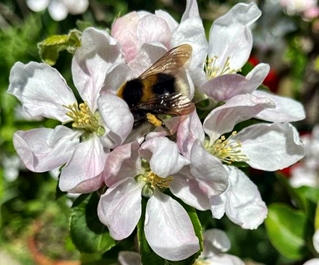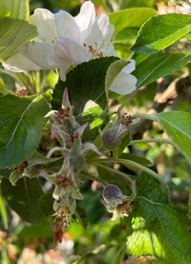

Many apple growers are venturing into grape growing for wine production, and visit to Adrian Scripps Ltd at Hononton Farm, Brenchley in Kent on Tuesday evening by members of East Kent Fruit Society (EKFS) illustrated how a leading apple grower is embracing viticulture and and high value branded apples.
Welcomed by MD James Simpson to Hononton Farm, one of five farms owned by Adrian Scripps Ltd and spread across Kent, EKFS members were treated to a prime example of how to compete in these financially difficult times. Pink Lady and Grapes replacing some of the Gala orchards.
Sustainably farming 750 hectares on specially selected sites across Kent makes us one of the UK's largest growers of Apples, Blackcurrants and Grapes, employing over 100 permanent staff and many additional seasonal workers.
James introduced Farm Manager Charles Hutton-Squire and Assistant Manager Phil to the members.
Our first visit - GRAPES
Workshop - 0.25 Ha of Chardonnay planted in 2012
2.5mm x 1m = 4.000 vines/Ha
First harvest 2014 5.7T/Ha
Budget for 2023 7 T/Ha
Best yields to date 12.4 T/Ha
Below: James in Workshop Vineyard
James said this was their first vineyard, planted in 2012 and utilising 'second hand' materials from previous apple orchards. Training was also influenced by the site status quo and
The two main training methods are the Guyot and the rod and spur (or cordon) systems.
Below: Single Guyot training example
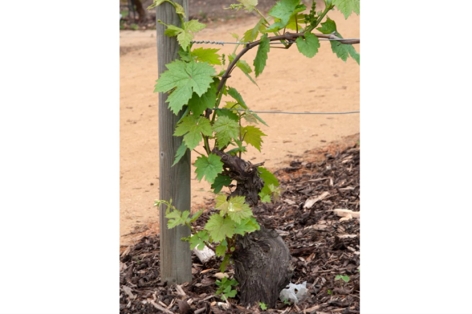
Below: Radu Tandarescu explains some of the nuances of vine pruning and different grape varieties
Radu has experience of growing Gamay (red grape) at the Adrian Scripps Cobham Farm.
Below: Illustration of double Guyot pruning
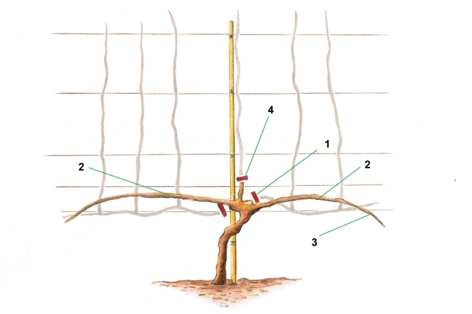
Bungalow - 1.5 Ha planted in 2016
Chardonnay - Pinot Noir - Gamay
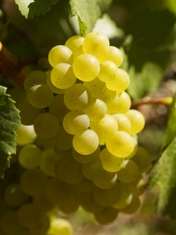
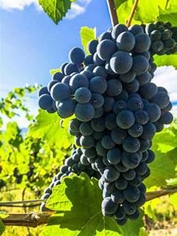
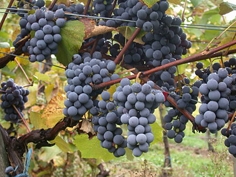
Below: left. Scott Raffle Senior Knowledge Exchange Manager - East Malling and right. Dr Flora O'Brien updates members on the Experimental Vineyard at NIAB
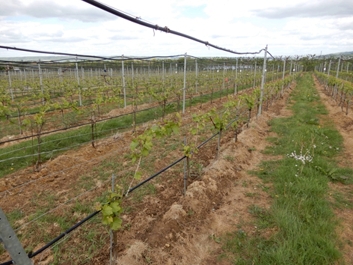
An important element in the new research centre is the Wine Innovation Centre and Research Winery
A 260sq metre research winery, coming soon!
Including: Fermentation area - Temperature controlled cellar - Pressing room - Laboratory area.
Walking from Workshop Vineyard, we passed a large Gala orchard due for immediate grubbing
This is a sign of the times, an otherwise productive Gala orchard, though not productive enough in these times of low prices for UK Gale and high production costs driven by increases in energy, fuel, wages, fertiliser, protectant sprays etc.
The English Apple Man Comments.
Probably the only home grown apples able to earn a small profit are the Branded Club varieties. Like Jazz and Pink Lady.
Hence it is easy to see why leading growers like Adrian Scripps Ltd are reducing the lower value apples like Gala and targeting Grapes and Pink Lady.
Pink Lady @ Adrian Scripps Ltd
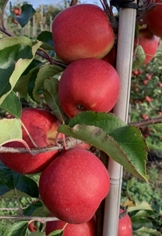 First trials in 2018/2019 with Pink Lady
First trials in 2018/2019 with Pink Lady
Large scale planting in
2020/2021 - circa 15.000 trees
2021/2022 - 40,000 trees @ Wenderton Farm, Wingham (East Kent)
2022/2023 - 50,500 trees @ Wenderton, Hononton Farm and Moat Farm
James informed EKFS members that two clones of Pink Lady have been planted: Seksie (lady in Red) and Rosy Glow.
Standard planting distance - 3.25m x 1m. Some on 3.5m x 1m depending on soil depth. Twin stem trials 3.25m x 0.75m.
Tree quality variable due late agreement and availability!
General comment from others with UK plantings of Pink Lady, "Pink Lady trees received of poor quality, but it does not seem to matter as trees are described as very growy!
Below: Rows of Pink Lady (Seksie (lady in Red) clone ) and right. Pink Lady at the early fruit let stage on Tuesday evening
Below: left. Pink Lady (Rosy Glow clone) and right Chardonnay grapes
Up on the hill, before descending to the farmyard for excellent refreshments, we enjoyed an extensive discussion about apples, grapes,
weed control, irrigation, the cost/return difference between apples and grapes and more besides ............
Gala apples, our national apple for nearly two decades, but unless inputs go down in cost and Gala go up in price, surely only the very best orchards (??) will survive. Branded Club apples like Pink Lady and Jazz look safe (at the moment) and it seems like everyone is planting grapes for wine production.
Comments from growers present...................
Weeding? Herbicide strip? cultivated strip? using electricity to give better weed control at a lower cost? high powered water jets?
The discussion revolved around, "well not disturbing the earth is the idea" - "herbicide then" - "I have to cultivate many times a year because my Winery will not accept herbicide" - "We have tried high pressure water jets" - "electricity looks promising, but equipment very expensive"
Observation: "Herbicide does less damage and leaves the soil free from disturbance, but the desire is to get rid of herbicides!
Irrigating grapes? "Well, I can't as my Winery will not allow it" - "Yes, many don't but it is changing"
Well, the debate over hand picking and machine picking is well under way now, with at least half a dozen machines harvesting in the UK this year" - some wineries don't like it, but if we are to create a high quality English Sparkling Wine at a sensible retail price - £15 a bottle then that will how it wil be achieved!
A final comment from James Simpson to questions about the viability of grapes v apples
"Apples may (may) generate a much higher total (gross) financial return per hectare, but they carry much greater onward costs".
"Grapes once harvested are delivered to the winery"
Apples harvested into long term storage, packing and packaging. On the tree perhaps £ 30,000 after sales net return probably £20,000
Grapes harvested straight to Winery, return probably £20,000.
![]() That is all for this week
That is all for this week
Take care
The English Apple Man
Below: Just to show how quickly things change, Red Devil in bloom 2 weeks ago and today same bud at early fruitlet stage
